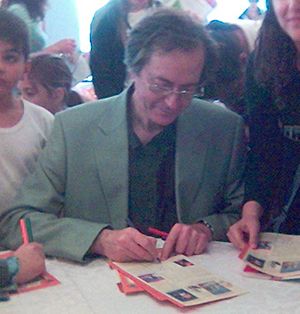Eugene Trivizas facts for kids
Quick facts for kids
Eugene Trivizas
|
|
|---|---|

Trivizas signing autographs
|
|
| Born | 1946 (age 79–80) Athens, Greece |
| Occupation | Sociologist, author |
| Years active | 1969–present |
Eugene Trivizas (Greek: Eυγένιος Τριβιζάς, Evgenios Trivizas; born 1946) is a famous Greek writer. He is especially known for his wonderful children's books. He is also a sociologist, which means he studies how people live and behave in groups.
In 2006, Eugene Trivizas was a finalist for the international Hans Christian Andersen Award. This award is a very big honor for children's writers.
Contents
About Eugene Trivizas
Early Life and Education
Eugene Trivizas was born in Athens, Greece, in 1946. He studied law at the University of Athens. After that, he became a lawyer in Athens in 1972.
He continued his studies in London, England. He earned more degrees in law, including one focused on how different countries handle criminal cases. Later, he earned his PhD in Criminology from the London School of Economics and Political Science. Criminology is the study of crime and why people commit crimes.
Teaching Career
Since 1978, Mr. Trivizas has taught about crime and society at the University of Reading in England. He helps students understand why people break rules and how society deals with it. He has also taught at other universities, including the Panteion University of Social and Political Sciences in Athens.
He has guided many students who were working on their PhD degrees. These students were doing advanced research in sociology and criminology.
Research and Studies
Eugene Trivizas was one of the first people to study large groups of people and their behavior in England. He looked at how crowds acted, how the Police handled them, and how courts treated people involved. This included studying crowds at football games, political events, and music festivals.
He spent two years working with the Metropolitan Police in London. He was allowed to see police records and even go with officers during their duties. This helped him understand how police manage crowds and how they decide to charge people with crimes.
He also studied how fear can affect people's actions. For example, he researched if people were less likely to steal luggage at train stations after public safety concerns were widely reported. His research showed that there was a short drop in luggage thefts during these times. This suggested that people might have been more careful or worried about getting caught.
His Amazing Books
Eugene Trivizas is one of Greece's most important writers for children. He has written over one hundred books, and they are all still being printed today! He has won more than twenty awards for his writing, both in Greece and around the world.
Many of his stories have been turned into plays for the stage, TV shows, and radio programs. He is the most popular writer of children's plays in Greece. In 1986, his play The Carecrow was recognized internationally for its excellent writing.
The Three Little Wolves and the Big Bad Pig
His first book published in English was The Three Little Wolves and the Big Bad Pig. It was illustrated by Helen Oxenbury and came out in 1993. This book is a fun twist on the classic "Three Little Pigs" story.
The Economist magazine said that only a very talented writer could change a classic tale and make it just as funny and thought-provoking. The Three Little Wolves became a best-seller in America for picture books. It won many awards, including the "Parents' Choice Gold Award", and has been translated into fifteen languages.
Unique Storytelling
Trivizas also wrote two unique books called "The 33 pink rubies" and "The 88 small stuffed vine leaves." These books are part of a series called "Multiclone." They are described as "magic books containing 1000 hidden tales." They are like "Choose Your Own Adventure" books, where the story changes each time you read them.
The Coca-Cola Case
In 1997, Eugene Trivizas had a legal disagreement with The Coca-Cola Company. He won the first part of the case. Coca-Cola wanted to use the name "Fruitopia" for their fruit drinks in Greece. But Trivizas already had a TV show and comic books with that name.
The court decided that Coca-Cola had used his idea without permission. Coca-Cola appealed the decision, but in December 1999, the court ruled in favor of Trivizas again. This showed that his creative work was protected.
His Works
-
- This book has been translated into many languages, including Chinese, Dutch, English, Finnish, Japanese, Portuguese, and Welsh.

